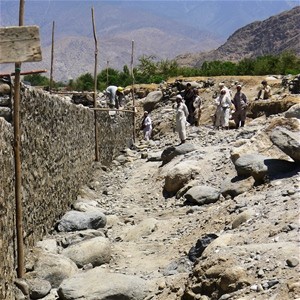
Dar-e-Noor residents rebuilding a flood protection wall near an intake. Many of the laborers at this worksite are recent returnees from Pakistan.
USAID/CDP/CADG
With conditions improving in Dar-e-Noor District, refugees are beginning to return to their homes from Pakistan
20 SEPTEMBER 2011 | NANGARHAR, AFGHANISTAN
Thousands of refugees were driven from the Dar-e-Noor District in northern Nangahar Province to Pakistan by war and instability during the last 30 years. Despite security improvements, many have chosen to remain in Pakistan rather than face the poverty that has consumed their home villages.
As one of many stabilization activities, USAID and its implementing partner, Central Asia Development Group launched a project to repair 40 intakes and 12 karez well systems across the nine villages that make up the Dar-e-Noor District. Farid is a laborer on one of 52 USAID-sponsored irrigation worksites in the district. However, he came with more than just work on his mind. He said, "I am here as a laborer, but I also came to survey the conditions of this district. I was sent by a group of 50 families in Pakistan who fled this area 30 years ago. The conditions have improved dramatically since then."
At present, the project employs more than 3,300 residents, many of whom are recent returnees like Farid. In addition to enjoying several months of income and benefitting from improved irrigation, many of these returnees will be able to make small investments in land that will be recovered from active flood zones. In this case, the 2,000 ha that will be protected from flood-borne erosion will provide enough land for 5,000 families.
"Now that conditions are improving, I have recommended that these families return. I have been working on this project for several weeks now. My improved pay and improved circumstances will be enough to convince the families to come back. If they do, they can find work on the project. In the long term, those who return can work as tenant farmers," said Farid. "With irrigation improvements, our twenty percent share of the farmer’s crop will mean more wheat and produce, which is very good for us."
Farid is one returnee who does not plan to go back to Pakistan. He said, "This project has helped to improve the conditions in Dar-e-Noor. My wife and her family are also here now. I hope that more families who left this area 30 years ago will return within the next few months. I am sure they will look forward to staying here again."







Comment
Make a general inquiry or suggest an improvement.